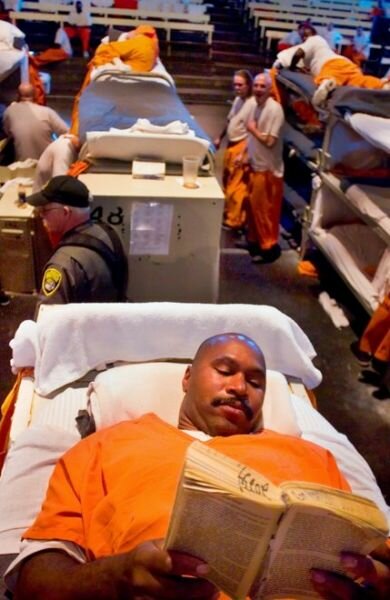Governor Schwarzenegger’s plan for prisons ignores racial history
Racial Equity — By Michelle Alexander on January 18, 2010 at 11:06In a move nearly as audacious as his fleet of Hummers, Gov. Arnold Schwarzenegger elated many public educators and criminal justice reformers in his State of the State speech by publicly embracing the “books not bars” motto that had been a rallying cry of grass-roots organizations for a decade.
Schwarzenegger declared that California should no longer spend more money on prisons than education and proposed a state constitutional amendment that would reverse the current spending ratio. “The priorities have become out of whack over the years,” he said. “What does it say about any state that focuses more on prison uniforms than on caps and gowns?”
Good question, Governor.
California has long been a national leader in mass imprisonment – which is really saying something, since our nation leads the world. No other nation in the world puts so many of its own people in cages.
Until very recently, the governor didn’t seem terribly bothered by that fact. He gave lip service to the need to reduce the state’s prison population, but in practice fought tooth and nail lawsuits that were designed to achieve that very result.
Last February, a federal court ordered the state to reduce California’s prison population by as many as 55,000 inmates within three years to provide a constitutional level of medical care to prisoners and adequate living conditions. California prisons had been operating at twice their capacity. Evidence of deplorable living conditions and inadequate medical care led federal judges to conclude that the state’s prison system was killing at least one inmate a month and violated the Eighth Amendment’s ban on cruel and unusual punishment. Schwarzenegger, however, was unfazed. The state vowed to appeal those decisions, decrying federal intervention in state affairs, despite the fact it was predicted that the reforms ordered by the court could save the state up to $900 million a year – money that certainly could have been spent on caps and gowns.
So what changed?
Few people seem to believe Schwarzenegger experienced a moral awakening, despite his claims that he was moved by university students protesting drastic budget cuts. Everyone knows this is about the numbers. He’s staring down the barrel of a $20 billion deficit, few options and a bleak legacy. So what if he’s playing politics and trying to pass it off as a grand gesture? Shouldn’t we celebrate anyway?
Perhaps not. Caution is in order – not because of what Schwarzenegger said, but rather what he didn’t say. For example, he didn’t say that prison sentences should be drastically reduced or that “three-strikes” laws for minor crimes should be abandoned. In fact, he said close to nothing about how spending on prisons would be funneled to schools, except to suggest that the prison system could be operated more cheaply if it were privatized.
That announcement most certainly cheered the Corrections Corp. of America – the nation’s largest private prison company. Wall Street investors would be the primary beneficiaries of any large-scale privatization effort, and there is good reason to believe that problems plaguing California’s prisons will get much worse, not better, if private companies slash the amount of money spent on health care, shelter and food, without policy changes dramatically reducing the number of people behind prison walls.
But even if prison privatization were not an issue, a much deeper moral problem remains – one Schwarzenegger failed to acknowledge.
The skyrocketing incarceration rates of the past three decades have not affected all segments of California’s population equally. African Americans and Latinos have been hardest hit, thanks largely to the war on drugs – a war that has targeted people of color for drug crimes, even though studies show they are no more likely to use or sell illegal drugs than whites.
Several days ago, the 9th U.S. Circuit Court of Appeals acknowledged the rampant racial bias in the criminal justice system, particularly in the prosecution of the drug war. It struck down Washington state’s law prohibiting felons from voting as a violation of the Voting Rights Act, on the grounds that uncontroverted evidence exists that racial bias permeates the criminal justice system.
Those who imagine that the bias documented in Washington does not exist in California should recall the wave of racial profiling studies that were conducted several years ago documenting biased stop and search practices in dozens of police departments, including the California Highway Patrol.
The uncomfortable reality we must face is that California, like the nation as a whole, has treated generations of African Americans and Latinos as largely disposable. They have been rounded up by the thousands, locked in cages, and upon release ushered into a parallel social universe in which they can be denied the right to vote, automatically excluded from juries and legally discriminated against in employment, housing, access to education and public benefits – reminiscent of an era we supposedly left behind. Most of the people labeled felons are not murderers or dangerous criminals. They are black and brown, very poor and paying the price of a get-tough movement driven not by crime rates, but by politics – a politics that has scapegoated the most vulnerable as a means of scoring political points.
Some might argue that the racial history doesn’t matter now, so long as the tide has begun to turn. The problem, though, is that if we fail to reckon with our history, we will be doomed to repeat it. If and when the economy improves, we’ll be able to afford once again to round up people of color en masse for imprisonment and social excommunication.
The subtext of Schwarzenegger’s speech was that we need not worry about who’s in prison or why, so long as it doesn’t cost too much or interfere with the ability of middle-class university kids to get a good education. But private prisons that warehouse impoverished black and brown folks, while the relatively privileged trot off to college, are not a step in the right direction.
What we need now is not a grand speech, but a day of reckoning.
Tags: prisons, race, Racial Equity, Schwarzenegger, Talking about RaceAuthor: Michelle Alexander (4 Articles)

A longtime civil rights advocate and litigator, MICHELLE ALEXANDER won a 2005 Soros Justice Fellowship and now holds a joint appointment at the Kirwan Institute for the Study of Race and Ethnicity and the Mortiz College of Law at Ohio State University. Alexander servec for several years as director of the Racial Justice Project at the ACLU of Northern California, and subsequently directed the Civil Rights Clinics at Stanford Law School, where she was an associate professor. Alexander is a former law clerk for Justice Harry Blackmun on the U.S. Supreme Court and has appeared as a commentator on CNN, MSNBC, and NPR. The New Jim Crow is her first book.



 Share This
Share This Tweet This
Tweet This Digg This
Digg This Save to delicious
Save to delicious Stumble it
Stumble it





 Dee Brown’s book on its 40th anniversary
Dee Brown’s book on its 40th anniversary Neither conspiracy nor post-racialism
Neither conspiracy nor post-racialism Black leaders must seize the moment
Black leaders must seize the moment








1 Comment